Unit 1 What's matter 知识点讲义
文档属性
| 名称 | Unit 1 What's matter 知识点讲义 | 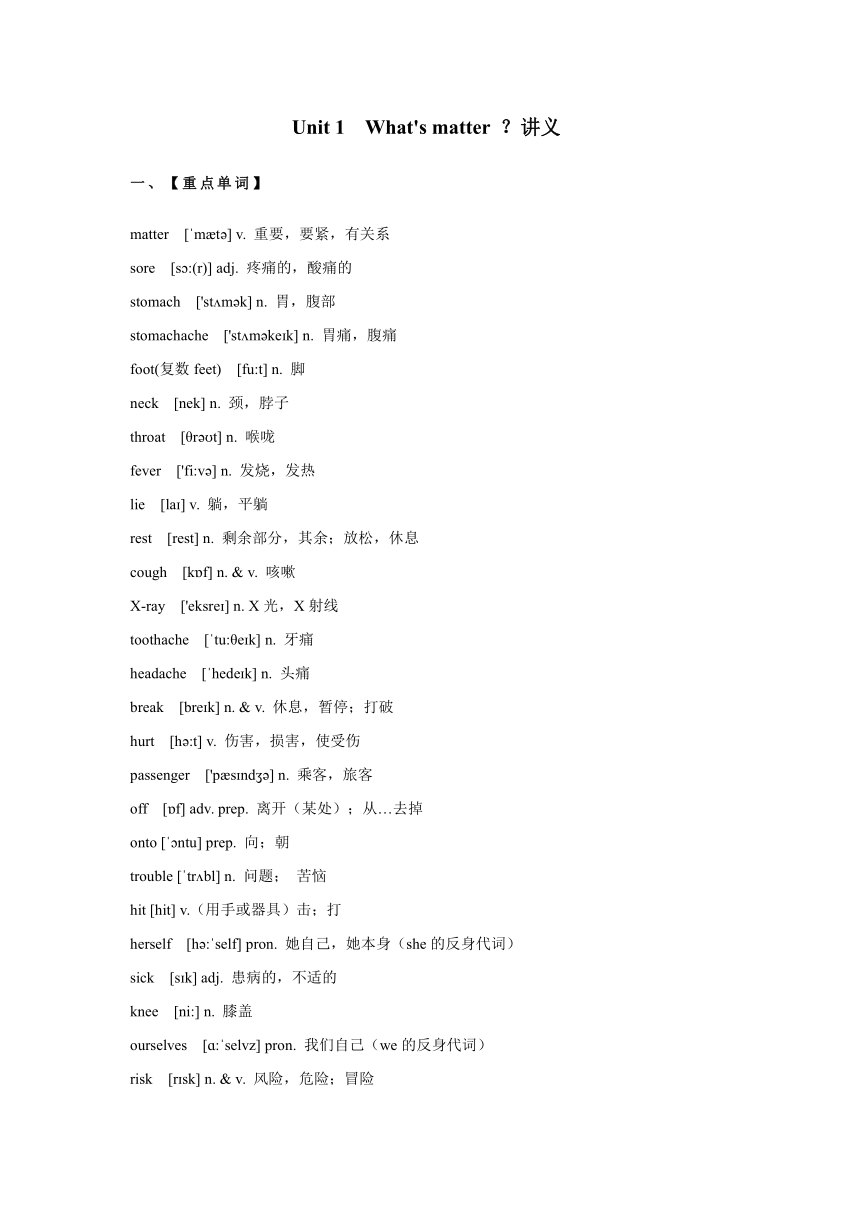 | |
| 格式 | docx | ||
| 文件大小 | 40.2KB | ||
| 资源类型 | 教案 | ||
| 版本资源 | 人教新目标(Go for it)版 | ||
| 科目 | 英语 | ||
| 更新时间 | 2021-04-07 22:38:52 | ||
图片预览

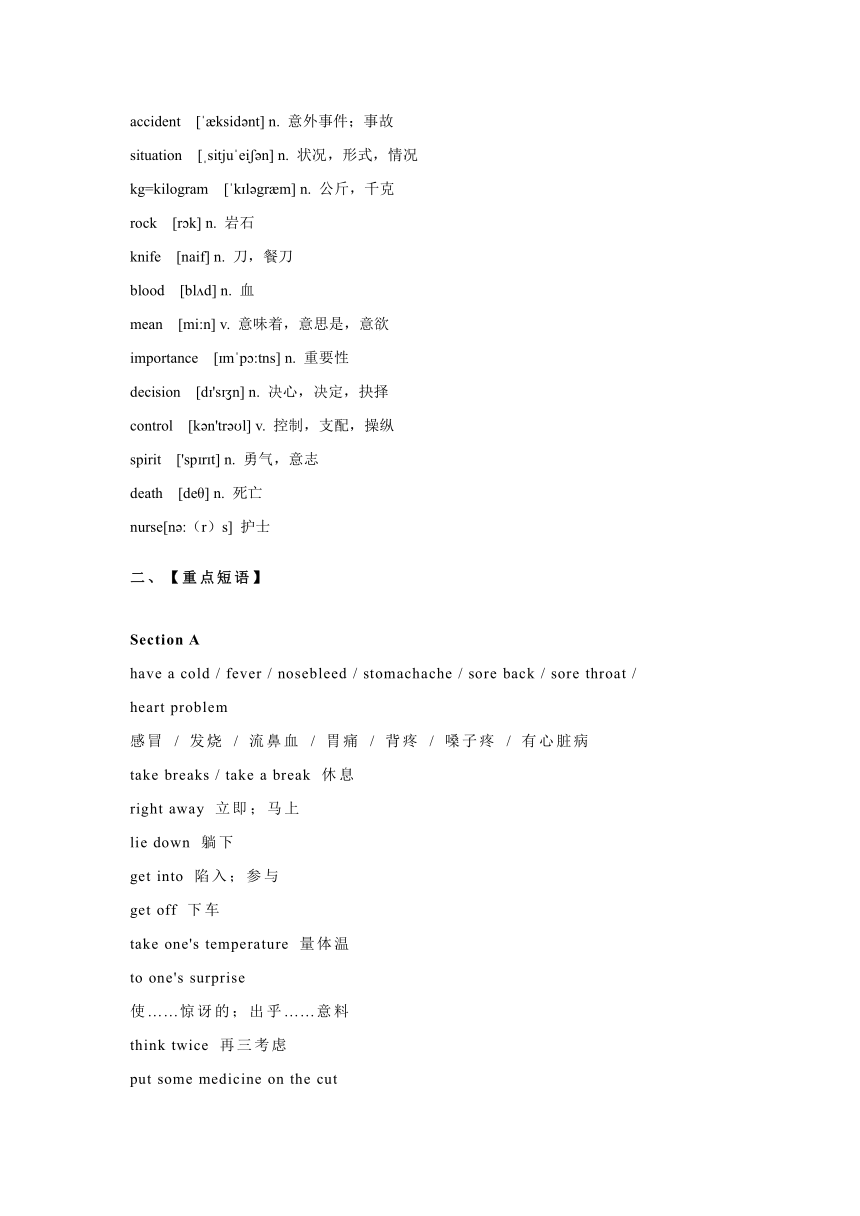
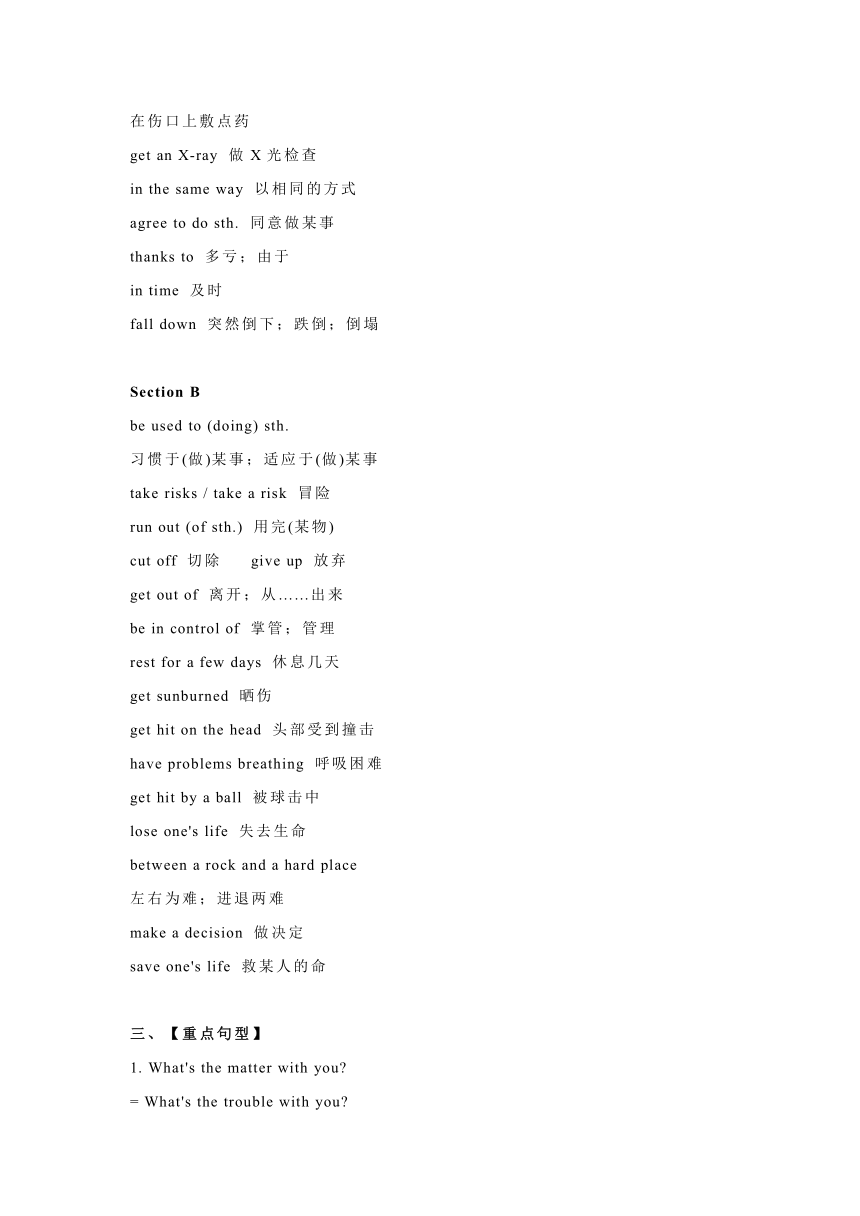
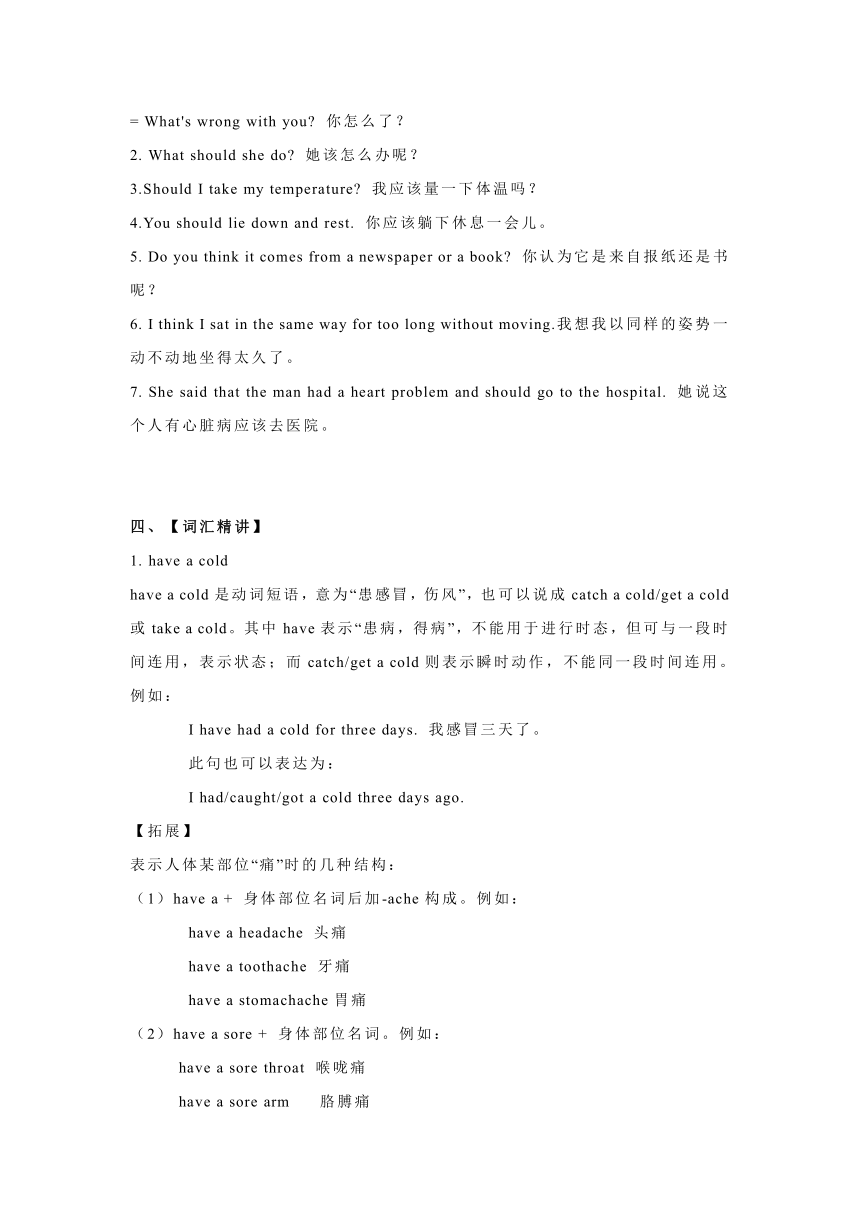
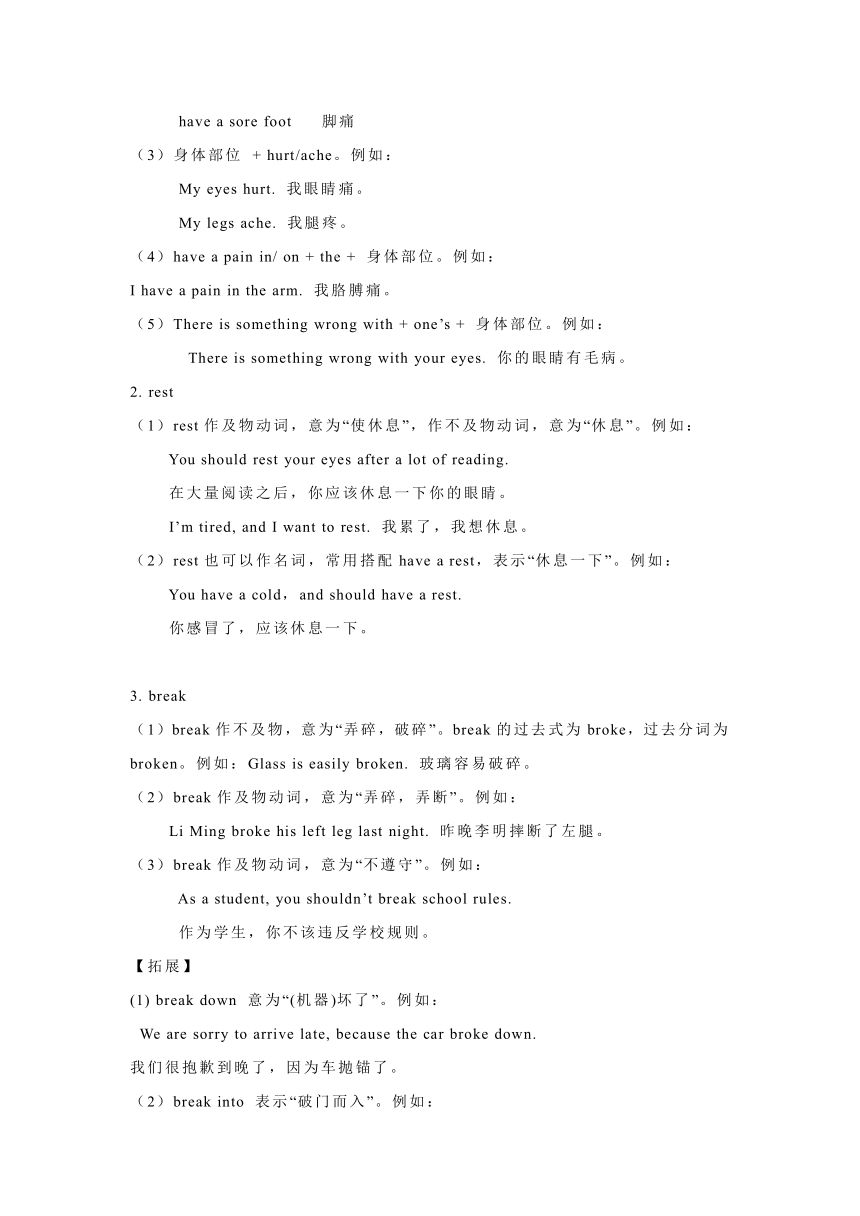
文档简介
Unit 1 What's matter ?讲义
【重点单词】
matter [?m?t?] v. 重要,要紧,有关系
sore [s?:(r)] adj. 疼痛的,酸痛的
stomach ['st?m?k] n. 胃,腹部
stomachache ['st?m?ke?k] n. 胃痛,腹痛
foot(复数feet) [fu:t] n. 脚
neck [nek] n. 颈,脖子
throat [θr??t] n. 喉咙
fever ['fi:v?] n. 发烧,发热
lie [la?] v. 躺,平躺
rest [rest] n. 剩余部分,其余;放松,休息
cough [k?f] n. & v. 咳嗽
X-ray ['eksre?] n. X光,X射线
toothache [?tu:θe?k] n. 牙痛
headache [?hede?k] n. 头痛
break [bre?k] n. & v. 休息,暂停;打破
hurt [h?:t] v. 伤害,损害,使受伤
passenger ['p?s?nd??] n. 乘客,旅客
off [?f] adv. prep. 离开(某处);从…去掉
onto [??ntu] prep. 向;朝
trouble [?tr?bl] n. 问题; 苦恼
hit [hit] v.(用手或器具)击;打
herself [h?:?self] pron. 她自己,她本身(she的反身代词)
sick [s?k] adj. 患病的,不适的
knee [ni:] n. 膝盖
ourselves [ɑ:?selvz] pron. 我们自己(we的反身代词)
risk [r?sk] n. & v. 风险,危险;冒险
accident [??ksid?nt] n. 意外事件;事故
situation [?sitju?ei??n] n. 状况,形式,情况
kg=kilogram [?k?l?gr?m] n. 公斤,千克
rock [r?k] n. 岩石
knife [naif] n. 刀,餐刀
blood [bl?d] n. 血
mean [mi:n] v. 意味着,意思是,意欲
importance [?m?p?:tns] n. 重要性
decision [d?'s??n] n. 决心,决定,抉择
control [k?n'tr??l] v. 控制,支配,操纵
spirit ['sp?r?t] n. 勇气,意志
death [deθ] n. 死亡
nurse[n?:(r)s] 护士
【重点短语】
Section A
have a cold / fever / nosebleed / stomachache / sore back / sore throat /
heart problem
感冒 / 发烧 / 流鼻血 / 胃痛 / 背疼 / 嗓子疼 / 有心脏病
take breaks / take a break 休息
right away 立即;马上
lie down 躺下
get into 陷入;参与
get off 下车
take one's temperature 量体温
to one's surprise
使……惊讶的;出乎……意料
think twice 再三考虑
put some medicine on the cut
在伤口上敷点药
get an X-ray 做X光检查
in the same way 以相同的方式
agree to do sth. 同意做某事
thanks to 多亏;由于
in time 及时
fall down 突然倒下;跌倒;倒塌
Section B
be used to (doing) sth.
习惯于(做)某事;适应于(做)某事
take risks / take a risk 冒险
run out (of sth.) 用完(某物)
cut off 切除 give up 放弃
get out of 离开;从……出来
be in control of 掌管;管理
rest for a few days 休息几天
get sunburned 晒伤
get hit on the head 头部受到撞击
have problems breathing 呼吸困难
get hit by a ball 被球击中
lose one's life 失去生命
between a rock and a hard place
左右为难;进退两难
make a decision 做决定
save one's life 救某人的命
【重点句型】
1. What's the matter with you?
= What's the trouble with you?
= What's wrong with you? 你怎么了?
2. What should she do? 她该怎么办呢?
3.Should I take my temperature? 我应该量一下体温吗?
4.You should lie down and rest. 你应该躺下休息一会儿。
5. Do you think it comes from a newspaper or a book? 你认为它是来自报纸还是书呢?
6. I think I sat in the same way for too long without moving.我想我以同样的姿势一动不动地坐得太久了。
7. She said that the man had a heart problem and should go to the hospital. 她说这个人有心脏病应该去医院。
四、【词汇精讲】
1. have a cold
have a cold是动词短语,意为“患感冒,伤风”,也可以说成catch a cold/get a cold或take a cold。其中have表示“患病,得病”,不能用于进行时态,但可与一段时间连用,表示状态;而catch/get a cold则表示瞬时动作,不能同一段时间连用。例如:
I have had a cold for three days. 我感冒三天了。
此句也可以表达为:
I had/caught/got a cold three days ago.
【拓展】
表示人体某部位“痛”时的几种结构:
(1)have a + 身体部位名词后加-ache构成。例如:
have a headache 头痛
have a toothache 牙痛
have a stomachache胃痛
(2)have a sore + 身体部位名词。例如:
have a sore throat 喉咙痛
have a sore arm 胳膊痛
have a sore foot 脚痛
(3)身体部位 + hurt/ache。例如:
My eyes hurt. 我眼睛痛。
My legs ache. 我腿疼。
(4)have a pain in/ on + the + 身体部位。例如:
I have a pain in the arm. 我胳膊痛。
(5)There is something wrong with + one’s + 身体部位。例如:
There is something wrong with your eyes. 你的眼睛有毛病。
2. rest
(1)rest作及物动词,意为“使休息”,作不及物动词,意为“休息”。例如:
You should rest your eyes after a lot of reading.
在大量阅读之后,你应该休息一下你的眼睛。
I’m tired, and I want to rest. 我累了,我想休息。
(2)rest也可以作名词,常用搭配have a rest,表示“休息一下”。例如:
You have a cold,and should have a rest.
你感冒了,应该休息一下。
3. break
(1)break作不及物,意为“弄碎,破碎”。break的过去式为broke,过去分词为broken。例如:Glass is easily broken. 玻璃容易破碎。
(2)break作及物动词,意为“弄碎,弄断”。例如:
Li Ming broke his left leg last night. 昨晚李明摔断了左腿。
(3)break作及物动词,意为“不遵守”。例如:
As a student, you shouldn’t break school rules.
作为学生,你不该违反学校规则。
【拓展】
(1) break down 意为“(机器)坏了”。例如:
We are sorry to arrive late, because the car broke down.
我们很抱歉到晚了,因为车抛锚了。
(2)break into 表示“破门而入”。例如:
I caught two men trying to break into the office. 我瞧见两个人想闯入我的办公室。
break out 表示“(战争、瘟疫、火灾等)爆发”。例如:World War II broke out in September 1939. 第二次世界大战爆发于1939年9月。
4. hurt
(1)hurt作及物动词,意为“使受伤,使弄痛”,过去分词和过去式都是hurt。例如:
He hurt his right knee. 他伤了右膝。
I hope you haven’t hurt yourself. 但愿你没有受伤。
(2) hurt 既可指肉体上的伤害,也可指精神上、感情上的伤害。例如:
You hurt her feelings when you said she was fat.
你说她胖,伤害了她的感情了。
I don’t mean to hurt you. 我并非有意伤害你。
(3)hurt作不及物动词,意为“疼痛”。例如:
My feet hurt when I walk. 我走路时脚疼。
I caught a cold and my head hurt. 我感冒了而且头痛。
5. free
free作及物动词,意为“使自由”。例如:
Can you free me for half an hour? 你能让我自由一个小时吗?
【拓展】
(1)free作形容词,表示“自由的;空闲的”。例如:
You are free to ask questions. 你可以请随便问。
Are you free tomorrow?你有空吗?
(2)free还可作“免费的”。例如:
Are the drinks free? 这饮料是免费的吗?
The books are given away free. 这些书是免费赠送的。
(3)free的副词freely可表示“自由地,随便地等”,可位于动词之前或之后。例如:
You may speak freely. 你可以直言。
He could write freely about it now. 他可以自由地写这个事了。
6.mean
(1)mean作及物动词,表示“打算,意味着”,后接名词,动词不定式短语或从句。例如:
The red light means “Stop”. 红灯表示停止。
I mean to go shopping. 我的意思是去购物。
The sign means that the road is blocked. 这个标志表示此路不通。
(2)mean的名词形式是“meaning”,表示“意思、含义”。例如:
What’s the meaning of the word?这个单词的是什么意思?
(3)What do / did you mean by...? 该句型的意思是“你……是什么意思?” 例如:
What do you mean by acting like this? 你这样做是什么意思?
7. lie
lie是动词,意为“躺”,过去式和过去分词分别为lay和lain,现在分词为lying。例如:
I found he was lying on the ground. 我发现他躺在地上。
【拓展】
(1) lie有“位于”的意思。例如:
A temple lies on the top of the mountain. 一座寺庙位于山顶之上。
(2) lie作动词时,也可意为“撒谎”,过去式和过去分词是规则的,均为lied。lie也可用作名词,意为“谎言”。例如:
Don’t lie to me.不要向我撒谎。
The boy told a lie to me. 这个男孩向我撒了谎。
8.risk
risk为名词。risk也可作及物动词,后面跟名词、代词或动名词。如:risk one's life 冒着某人的生命危险,risk climbing mountains 冒险爬山
take risks=take a risk 冒险
五、【句式精讲】
1. What’s the matter?
What’s the matter?和What’s wrong?是用来询问对方出了什么毛病或问题,意为“怎么了?”,是医生询问病人病情时的常用语。例如:
????— What’s the matter? 你怎么了?
????—I have a stomachache. 我胃疼。
????—What’s wrong, Tom? Tom怎么了?
????—I don’t feel very well. 我感觉不太舒服。
【拓展】
??? What’s the matter?和What’s wrong?后可接with sb. / sth.,即What’s the matter with sb./ sth.?或What’s wrong with sb./sth.?意为“某人/某物怎么了?”例如:
??? What’s the matter with you? = What’s wrong with you? 你怎么了?
—What’s wrong / What’s the matter with your leg? 你的腿怎么了????
?—Nothing. 没什么。
注意:matter是名词,其前只能加定冠词the;wrong是形容词,前面不需要加任何冠词。能说What’s your wrong? 和What’s your matter?
2. —What should she do? —她该怎么办?
—She should take her temperature.—她该量量体温。
should作情态动词,意为“应当,应该”。表示义务、责任,可用于各种人称,无人称和数的变化,也不能单独作谓语,只能和主要动词一起构成谓语,表示说话人的语气和情态;否定形式为should not,缩写为shouldn’t。其主要用法有:
(1) 表示责任和义务,意为“应该”。例如:
??? You should take your teacher’s advice. 你应该听从你老师的建议。
??? You shouldn’t be late for class. 你不应该上课迟到。
(2) 表示推断,意为“可能,该”。例如:
The train should have already left. 火车可能已经离开了。
3. But to his surprise,they all agreed to go with him.
(1) surprise作动词时,意为“使……惊奇,使……感到意外、吃惊”。例如:
??? What surprised you? 什么事使你感到意外?
(2) surprise作不可数名词时,表示“惊奇,惊异”。例如:
????Her face showed surprise at the news.
????听到这个消息,她的脸上露出了惊奇的表情。
(3)surprise作可数名词时,表示“惊奇、惊讶、意外的事或吃惊的事”。例如:
????He gave me a surprise by arriving early.
????他的早到使我大感意外。
(4)作名词用时常可构成如下短语:
??? to one’s surprise意为“使某人吃惊的是……”;
??? in surprise意为“吃惊地 ”。例如:
????To my surprise, he passed the exam.
????使我吃惊是,他竟然通过了考试。
??? He looked at me in surprise. 他吃惊地望着我。
4. He was not ready to go that day.那天他还没准备好离开。
(1)ready 作形容词,意为“准备好的”。例如:
??? Is everything ready? 一切都准备好了吗?
??? Are you ready? 你准备好了吗?
(2)be/get ready to + 动词原形,意为“准备做……”。例如:
??? I’m getting ready to travel. 我正准备去旅行。
【拓展】
be ready for意为“准备去……”,后接名词或动名词,同义短语为get ready for。例如:
??? I’m ready for bed. 我正准备睡觉。
????The chicken will soon be ready for the pot.
????这些鸡肉很快就可以准备下锅了。
5.His love for mountain climbing is so great that he kept on climbing mountains even after this experience.
他是如此地热爱爬山以至于在经历这次事故之后,他仍然继续爬山。
so... that意为“如此……以至于……”,so后面接形容词或副词,that后面为结果状语从句。如:
He was so strong that he could lift the heavy bag easily.
他如此强壮以至于很容易就提起那个重包。
6.be used to taking risks?习惯于冒险
(1)在“be used to”这个结构中,to是介词,它后面接名词、代词或者动名词,不能跟动词原形。此外,“be used to”有各种时态的变化。如:
①She is used to that way of learning English.
她习惯用那种方法学习英语。
He has been used to playing basketball after school.
他已经习惯于放学后打篮球。
【语法精讲?】
(一)should和shouldn't表示建议
1.Should为情态动词,意为“应该;应当”,否定式为shouldn’t,其后接动词原形,无人称和数的变化。常用来表示征询意见、建议、劝告、要求或义务等。其结构为:主语+should/shouldn't(shouldn't =should not不应该)+动词原形。如:
You should lie down and rest.
你应该躺下休息。
He shouldn't go to school when he has a cold.
他感冒时不应该去上学。
You should drink hot water with honey.你应该喝加有蜂蜜的热水。
You shouldn’t watch TV.你不应该看电视。
should的一般疑问句的结构为:Should+主语+动词原形+其它?
should we tell her this?我们应该告诉她这件事吗?
Should的特殊疑问句(以what为例)结构为:What should+主语+动词原形?
What should Ido?我该怎么办?
【拓展】
在英语中,表示建议的说法有很多,而且都是中考考查的重点。
主要结构有:
①Would you like (to do) sth.?你想要/愿意(做)某事吗?
Would you like to play basketball with me?你想要和我一起打篮球吗?
②Shall I/we do sth ?我/我们做??好吗?
Shall we go to the zoo tomorrow?明天我们去动物园,好吗?
③Why not do sth ?为什么不呢?
Why not take her temperature?为什么不给她量下体温呢?
④How/What about doing sth ? 做某事怎么样?
How about go swimming?去游泳怎么样?
⑤Let’s do sth让我们做吧。
Let’s go home.咱们回家吧。
⑥You’d better (not) do sth你最好(不)要做某事。
You’d better not go there alone.你最好不要独自去那儿。
反身代词
表示“某人自己”的代词,叫反身代词,也叫自身代词。反身代词在句子中可以作宾语、表语和同位语,需要注意反身代词与所指代的名词或代词在人称、性别和数上保持一致。
反身代词的构成是:
第一人称和第二人称是“形容词性物主代词+-self/selves”。例如:myself(我自己),ourselves(我们自己),yourself(你自己),yourselves(你们自己)
第三人称是“宾格代词+-self/selves”;单数形式是加-self,复数形式是加-selves。例如:himself(他自己),herself(她自己),itself(它自己),themselves(他们自己)
注意:对于单数人称的反身代词加-self,对于复数人称的反身代词加-selves。
常用短语有:
by oneself 某人独自
enjoy oneself=have a good time 玩得开心
teach oneself 自学
help oneself to… 随便吃、喝……
dress oneself 自己穿衣服
hurt oneself 伤了自己
反身代词的用法
1.反身代词可以用作一些动词(短语)或介词的宾语,此时,句子的主语和宾语必须同一个人或物。
如:
(1). We must look after ourselves and keep fit.
我们必须照顾好自己,保持身体健康。
(2). She often buys herself nice clothes.她经常为自己买漂亮的衣服。
(3). Don’t think too much of yourself!别过多地为自己考虑!
2.反身代词在句中还可以用作主语或宾语的同位语,用来加强语气,表示“亲自、本人、本身”等意思。但反身代词在句中不能单独作主语。
如:
(1). I don’t need any help.I can do it myself.
我不需要帮助,我自己能做。(主语的同位语)
这句话不可表示成I don’t need any help,myself can do it.
(2). If you want to know more,you may ask Miss White herself.
如果你想了解更多情况,你可以问一问怀特小姐本人。(宾语的同位语)
3.反身代词在句中还可以用作连系动词的表语。
如:
(1). The little boy in the photo was himself.
照片中的那个小男孩就是他自己。
反身代词构成的固定表达:
1.★by oneself意为“独自,凭自己”,相当于alone;
enjoy oneself意为“玩得高兴,过得愉快”,相当于have fun或have a good/great/wonderful time;
help oneself to…意为“随便吃或喝点……,随便用……";
keep…to oneself意为“不将某事说出去”;
say to oneself意为“自言自语”。
(三)have表示“患病、遭受(病痛)”
(1)询问某人患了何种疾病或遇到了何种麻烦时,常用以下几种结构来表达:
What’s the matter (with sb.)?(某人)怎么了?
What’s wrong (with sb.)?(某人)怎么了?
What’s the trouble (with sb.)?(某人)出什么事了?
What happened (to sb.)?(某人)发生了什么事?
Are you OK? 你没事吧?
Is there anything wrong with sb.?某人有什么事吗?
(2)要表达身体疼痛或不舒服,可用以下结构:
①某人+have/has+病症.
The twins have colds.双胞胎感冒了。
Sb.+have/has+a+headache/toothache/stomachache/backache/earache.
She had a stomachache last night.她昨晚肚子痛。
③某人+have/has+a+sore+发病部位.
He has a sore throat.他喉咙痛。
④某人+hurt(s)+身体部位或反身代词.
He hurt his leg.他的腿受伤了。
⑤某部位+hurt(s).
My head hurts badly.我头痛得厉害。
⑥[拓展]某人+have/has+a pain+in one’s+身体部位,
I have a pain in my chest.我胸口痛。
⑦(There is)something wrong with one’s+身体部位.
There is something wrong with my right eye. 我的右眼有毛病。
七、【易混辨析】
1.too much和much too辨析
She talked too much yesterday and didn't drink enough water.
昨天她说话太多,并且没有喝足够的水。
(1)too much相当于一个副词,修饰动词talk,放在后面作状语,意为“太多”。如:
①She worried too much.
她过于担心了。
②Eating too much is bad for your health.
吃太多对你的健康有害。
(2)too much 还可以修饰不可数名词,too much中的中心词是“much”,意为“太多的……”,too是用来修饰much的。如:
There is too much snow and ice.冰雪太多。
而much too中的中心词是“too”,后面跟形容词或副词,意为“非常;太”。much是用来加强too的语气的。如:
It's much too cold.天太冷。
2.with和without辨析
drink some hot tea with honey
喝一些加蜂蜜的热茶
(1)with作介词,意为“具有;带有”,表示某物带有或具有某种特征。如:
She is a girl with big eyes.
她是一个大眼睛女孩。
(2)with的反义词为without,意为“没有”。如:
I think I sat in the same way for too long without moving.
我认为我保持同一个姿势一动不动地坐太久了。
3.see sb.do sth.和see sb.doing sth.辨析
(1)see sb.do sth. 意为“看见某人做某事”(看到动作发生的全过程或经常看到动作发生)。如:
I often see him play basketball on the playground.
我经常看见他在操场上打篮球。
(2)see sb.doing sth. 意为“看见某人正在做某事”(强调动作正在发生)。如:
I saw him playing basketball on the playground just now.
刚才我看见他正在操场上打篮球。
4.in time和on time辨析
in time表示“及时”,指在约定的时间之前发生。on time表示“准时;按时”,指正好在约定的时间发生。如:
①We hope you will arrive in time to attend the meeting.
我们希望你能及时赶来参加这个会议。
②I'll write to your father if you aren't here on time tomorrow.
倘若你明天不准时到的话,我就要写信告诉你父亲。
八、【考点精讲】
【考点1】不定冠词的用法
【典型例题】
根据汉语提示完成句子,每空一词。
1. — What’s the matter with you?
— I ________ ________ ________(发烧).
Mike ________ ________ ________(头疼). You should take him to the hospital.
【答案】have a fever ; has a headache
【解析】句意:—-你怎么了?我发烧。Mike头疼。你应该带他去医院。 “have+a+疾病或症状名词”表示“患(某种)病”或“有某种症状”,其中不定冠词a不能省略。如:have a stomachache胃疼,have a toothache牙疼,have a sore back背疼,have a cough咳嗽,have a cold感冒。故填have a fever ; has a headache
【考点2】get 用法
【典型例题】英汉互译.
get up
迷路
【答案】起床,站起 ; get lost
【解析】与get相关的常用短语还有: get popular 受欢迎,流行;get dressed穿上衣服;get back 回来;get out of 离开,从……出来;get on with和睦相处,关系良好。 故填 起床,站起 ;get lost.。
【考点3】be used to和used to辨析
【典型例题】 选词填空
be used to, used to
You ________________ see a lot of him, didn’t you?
Grandma _____________ live in a village, but now he _____________ living in the city.
【答案】used to;used to; is used to
【解析】句意:你以前经常见到他,是吗?奶奶过去住在一个村子里,但是现在他已经习惯住在城里了。be used to意为“习惯于……;适应于……”,其中to为介词,后接名词、代词或V-ing形式;used to意为“曾经……;过去常常……”,后接动词原形,没有时态、人称和数的变化。故填used to;used to; is used to 。
【考点4】
【典型例题】 根据汉语提示完成句子,每空词数不限。
Our time is ________________(用完). Let’s hurry up!
They ________________(用完) money and had to give up the plan.
【答案】running out ;ran out of
【解析】句意:我们的时间不多了,快点!。他们没钱了,不得不放弃这个计划。run out of意为“(某人)用光……”,表示主动意义,主语是人;run out of也可以表示“从……跑出来”。run out意为“(某物)被用完;被耗尽”,主语通常是表示时间、金钱、食物等的名词。故填running out ;ran out of 。
【考点5】情态动词should 的否定结构。
【典型例题】 改为否定句。
You should allow him to do that.
You ________________ allow him to do that..
【答案】shouldn’t
【解析】句意:你应该允许他做那件事。should为情态动词,意为“应该;应当”,否定式为shouldn’t,其后接动词原形,无人称和数的变化。常用来表示征询意见、建议、劝告、要求或义务等。其否定结构为:主语+shouldn't(shouldn't =should not不应该)+动词原形。故填shouldn’t 。
【考点6】反身代词
【典型例题】
She is old enough to dress ____________.
yourself B.himself C.herself D.itself
【答案】C
【解析】句意:她的年龄足够大,可以自己穿衣服了。反身代词是表示“某人自己”的代词,叫反身代词,也叫自身代词。反身代词在句子中可以作宾语、表语和同位语,需要注意反身代词与所指代的名词或代词在人称、性别和数上保持一致。根据句子主语She可知后面的反身代词用herself。故选C。
【考点7】too much,much too,too many,a little辨析
【典型例题】
The fish is too salty. You must put ____________salt in it .
A.too much B.too many C.much too D.a little
【答案】A
【解析】句意:这鱼太咸了,你一定是放太多的盐了。 too much“太多”,修饰不可数名词;too many“太多”修饰可数名词的复数形式;much too“太”,修饰形容词或副词;a little”一点”,修饰不可数名词。salt是不可数名词,根据句意可知用too much。故选A。
【考点8】because,because of辨析
【典型例题】
Tom did not go hiking with his classmates ____________ his illness .
because B.because of C.since
【答案】B
【解析】句意:because“由于:因为”,引导原因状语从句;because of,“由于:因为”,后跟名词,代词或动名词;since“自从”。根据句意及后面的his illness 可知选B。
九、【作文范文】
你的朋友Tom由于长时间玩电脑游戏,现在头痛、眼睛不舒服、腰背酸痛,并且睡不好觉。写一篇短文介绍一下他的情况,并给出你对他的建议。
词数:60词左右。
Tom is my friend. He likes playing computer games very much. He often sits in the same way for too long without moving. Now he has a headache, sore eyes and a sore back. He doesn’t sleep well at night, so he feels tired every day.
I think he should take breaks away from the computer. He shouldn’t use the computer for a long time. He should do eye exercises to relax his eyes and go to bed early at night.
I think if he has a good rest, he will feel well soon.
【重点单词】
matter [?m?t?] v. 重要,要紧,有关系
sore [s?:(r)] adj. 疼痛的,酸痛的
stomach ['st?m?k] n. 胃,腹部
stomachache ['st?m?ke?k] n. 胃痛,腹痛
foot(复数feet) [fu:t] n. 脚
neck [nek] n. 颈,脖子
throat [θr??t] n. 喉咙
fever ['fi:v?] n. 发烧,发热
lie [la?] v. 躺,平躺
rest [rest] n. 剩余部分,其余;放松,休息
cough [k?f] n. & v. 咳嗽
X-ray ['eksre?] n. X光,X射线
toothache [?tu:θe?k] n. 牙痛
headache [?hede?k] n. 头痛
break [bre?k] n. & v. 休息,暂停;打破
hurt [h?:t] v. 伤害,损害,使受伤
passenger ['p?s?nd??] n. 乘客,旅客
off [?f] adv. prep. 离开(某处);从…去掉
onto [??ntu] prep. 向;朝
trouble [?tr?bl] n. 问题; 苦恼
hit [hit] v.(用手或器具)击;打
herself [h?:?self] pron. 她自己,她本身(she的反身代词)
sick [s?k] adj. 患病的,不适的
knee [ni:] n. 膝盖
ourselves [ɑ:?selvz] pron. 我们自己(we的反身代词)
risk [r?sk] n. & v. 风险,危险;冒险
accident [??ksid?nt] n. 意外事件;事故
situation [?sitju?ei??n] n. 状况,形式,情况
kg=kilogram [?k?l?gr?m] n. 公斤,千克
rock [r?k] n. 岩石
knife [naif] n. 刀,餐刀
blood [bl?d] n. 血
mean [mi:n] v. 意味着,意思是,意欲
importance [?m?p?:tns] n. 重要性
decision [d?'s??n] n. 决心,决定,抉择
control [k?n'tr??l] v. 控制,支配,操纵
spirit ['sp?r?t] n. 勇气,意志
death [deθ] n. 死亡
nurse[n?:(r)s] 护士
【重点短语】
Section A
have a cold / fever / nosebleed / stomachache / sore back / sore throat /
heart problem
感冒 / 发烧 / 流鼻血 / 胃痛 / 背疼 / 嗓子疼 / 有心脏病
take breaks / take a break 休息
right away 立即;马上
lie down 躺下
get into 陷入;参与
get off 下车
take one's temperature 量体温
to one's surprise
使……惊讶的;出乎……意料
think twice 再三考虑
put some medicine on the cut
在伤口上敷点药
get an X-ray 做X光检查
in the same way 以相同的方式
agree to do sth. 同意做某事
thanks to 多亏;由于
in time 及时
fall down 突然倒下;跌倒;倒塌
Section B
be used to (doing) sth.
习惯于(做)某事;适应于(做)某事
take risks / take a risk 冒险
run out (of sth.) 用完(某物)
cut off 切除 give up 放弃
get out of 离开;从……出来
be in control of 掌管;管理
rest for a few days 休息几天
get sunburned 晒伤
get hit on the head 头部受到撞击
have problems breathing 呼吸困难
get hit by a ball 被球击中
lose one's life 失去生命
between a rock and a hard place
左右为难;进退两难
make a decision 做决定
save one's life 救某人的命
【重点句型】
1. What's the matter with you?
= What's the trouble with you?
= What's wrong with you? 你怎么了?
2. What should she do? 她该怎么办呢?
3.Should I take my temperature? 我应该量一下体温吗?
4.You should lie down and rest. 你应该躺下休息一会儿。
5. Do you think it comes from a newspaper or a book? 你认为它是来自报纸还是书呢?
6. I think I sat in the same way for too long without moving.我想我以同样的姿势一动不动地坐得太久了。
7. She said that the man had a heart problem and should go to the hospital. 她说这个人有心脏病应该去医院。
四、【词汇精讲】
1. have a cold
have a cold是动词短语,意为“患感冒,伤风”,也可以说成catch a cold/get a cold或take a cold。其中have表示“患病,得病”,不能用于进行时态,但可与一段时间连用,表示状态;而catch/get a cold则表示瞬时动作,不能同一段时间连用。例如:
I have had a cold for three days. 我感冒三天了。
此句也可以表达为:
I had/caught/got a cold three days ago.
【拓展】
表示人体某部位“痛”时的几种结构:
(1)have a + 身体部位名词后加-ache构成。例如:
have a headache 头痛
have a toothache 牙痛
have a stomachache胃痛
(2)have a sore + 身体部位名词。例如:
have a sore throat 喉咙痛
have a sore arm 胳膊痛
have a sore foot 脚痛
(3)身体部位 + hurt/ache。例如:
My eyes hurt. 我眼睛痛。
My legs ache. 我腿疼。
(4)have a pain in/ on + the + 身体部位。例如:
I have a pain in the arm. 我胳膊痛。
(5)There is something wrong with + one’s + 身体部位。例如:
There is something wrong with your eyes. 你的眼睛有毛病。
2. rest
(1)rest作及物动词,意为“使休息”,作不及物动词,意为“休息”。例如:
You should rest your eyes after a lot of reading.
在大量阅读之后,你应该休息一下你的眼睛。
I’m tired, and I want to rest. 我累了,我想休息。
(2)rest也可以作名词,常用搭配have a rest,表示“休息一下”。例如:
You have a cold,and should have a rest.
你感冒了,应该休息一下。
3. break
(1)break作不及物,意为“弄碎,破碎”。break的过去式为broke,过去分词为broken。例如:Glass is easily broken. 玻璃容易破碎。
(2)break作及物动词,意为“弄碎,弄断”。例如:
Li Ming broke his left leg last night. 昨晚李明摔断了左腿。
(3)break作及物动词,意为“不遵守”。例如:
As a student, you shouldn’t break school rules.
作为学生,你不该违反学校规则。
【拓展】
(1) break down 意为“(机器)坏了”。例如:
We are sorry to arrive late, because the car broke down.
我们很抱歉到晚了,因为车抛锚了。
(2)break into 表示“破门而入”。例如:
I caught two men trying to break into the office. 我瞧见两个人想闯入我的办公室。
break out 表示“(战争、瘟疫、火灾等)爆发”。例如:World War II broke out in September 1939. 第二次世界大战爆发于1939年9月。
4. hurt
(1)hurt作及物动词,意为“使受伤,使弄痛”,过去分词和过去式都是hurt。例如:
He hurt his right knee. 他伤了右膝。
I hope you haven’t hurt yourself. 但愿你没有受伤。
(2) hurt 既可指肉体上的伤害,也可指精神上、感情上的伤害。例如:
You hurt her feelings when you said she was fat.
你说她胖,伤害了她的感情了。
I don’t mean to hurt you. 我并非有意伤害你。
(3)hurt作不及物动词,意为“疼痛”。例如:
My feet hurt when I walk. 我走路时脚疼。
I caught a cold and my head hurt. 我感冒了而且头痛。
5. free
free作及物动词,意为“使自由”。例如:
Can you free me for half an hour? 你能让我自由一个小时吗?
【拓展】
(1)free作形容词,表示“自由的;空闲的”。例如:
You are free to ask questions. 你可以请随便问。
Are you free tomorrow?你有空吗?
(2)free还可作“免费的”。例如:
Are the drinks free? 这饮料是免费的吗?
The books are given away free. 这些书是免费赠送的。
(3)free的副词freely可表示“自由地,随便地等”,可位于动词之前或之后。例如:
You may speak freely. 你可以直言。
He could write freely about it now. 他可以自由地写这个事了。
6.mean
(1)mean作及物动词,表示“打算,意味着”,后接名词,动词不定式短语或从句。例如:
The red light means “Stop”. 红灯表示停止。
I mean to go shopping. 我的意思是去购物。
The sign means that the road is blocked. 这个标志表示此路不通。
(2)mean的名词形式是“meaning”,表示“意思、含义”。例如:
What’s the meaning of the word?这个单词的是什么意思?
(3)What do / did you mean by...? 该句型的意思是“你……是什么意思?” 例如:
What do you mean by acting like this? 你这样做是什么意思?
7. lie
lie是动词,意为“躺”,过去式和过去分词分别为lay和lain,现在分词为lying。例如:
I found he was lying on the ground. 我发现他躺在地上。
【拓展】
(1) lie有“位于”的意思。例如:
A temple lies on the top of the mountain. 一座寺庙位于山顶之上。
(2) lie作动词时,也可意为“撒谎”,过去式和过去分词是规则的,均为lied。lie也可用作名词,意为“谎言”。例如:
Don’t lie to me.不要向我撒谎。
The boy told a lie to me. 这个男孩向我撒了谎。
8.risk
risk为名词。risk也可作及物动词,后面跟名词、代词或动名词。如:risk one's life 冒着某人的生命危险,risk climbing mountains 冒险爬山
take risks=take a risk 冒险
五、【句式精讲】
1. What’s the matter?
What’s the matter?和What’s wrong?是用来询问对方出了什么毛病或问题,意为“怎么了?”,是医生询问病人病情时的常用语。例如:
????— What’s the matter? 你怎么了?
????—I have a stomachache. 我胃疼。
????—What’s wrong, Tom? Tom怎么了?
????—I don’t feel very well. 我感觉不太舒服。
【拓展】
??? What’s the matter?和What’s wrong?后可接with sb. / sth.,即What’s the matter with sb./ sth.?或What’s wrong with sb./sth.?意为“某人/某物怎么了?”例如:
??? What’s the matter with you? = What’s wrong with you? 你怎么了?
—What’s wrong / What’s the matter with your leg? 你的腿怎么了????
?—Nothing. 没什么。
注意:matter是名词,其前只能加定冠词the;wrong是形容词,前面不需要加任何冠词。能说What’s your wrong? 和What’s your matter?
2. —What should she do? —她该怎么办?
—She should take her temperature.—她该量量体温。
should作情态动词,意为“应当,应该”。表示义务、责任,可用于各种人称,无人称和数的变化,也不能单独作谓语,只能和主要动词一起构成谓语,表示说话人的语气和情态;否定形式为should not,缩写为shouldn’t。其主要用法有:
(1) 表示责任和义务,意为“应该”。例如:
??? You should take your teacher’s advice. 你应该听从你老师的建议。
??? You shouldn’t be late for class. 你不应该上课迟到。
(2) 表示推断,意为“可能,该”。例如:
The train should have already left. 火车可能已经离开了。
3. But to his surprise,they all agreed to go with him.
(1) surprise作动词时,意为“使……惊奇,使……感到意外、吃惊”。例如:
??? What surprised you? 什么事使你感到意外?
(2) surprise作不可数名词时,表示“惊奇,惊异”。例如:
????Her face showed surprise at the news.
????听到这个消息,她的脸上露出了惊奇的表情。
(3)surprise作可数名词时,表示“惊奇、惊讶、意外的事或吃惊的事”。例如:
????He gave me a surprise by arriving early.
????他的早到使我大感意外。
(4)作名词用时常可构成如下短语:
??? to one’s surprise意为“使某人吃惊的是……”;
??? in surprise意为“吃惊地 ”。例如:
????To my surprise, he passed the exam.
????使我吃惊是,他竟然通过了考试。
??? He looked at me in surprise. 他吃惊地望着我。
4. He was not ready to go that day.那天他还没准备好离开。
(1)ready 作形容词,意为“准备好的”。例如:
??? Is everything ready? 一切都准备好了吗?
??? Are you ready? 你准备好了吗?
(2)be/get ready to + 动词原形,意为“准备做……”。例如:
??? I’m getting ready to travel. 我正准备去旅行。
【拓展】
be ready for意为“准备去……”,后接名词或动名词,同义短语为get ready for。例如:
??? I’m ready for bed. 我正准备睡觉。
????The chicken will soon be ready for the pot.
????这些鸡肉很快就可以准备下锅了。
5.His love for mountain climbing is so great that he kept on climbing mountains even after this experience.
他是如此地热爱爬山以至于在经历这次事故之后,他仍然继续爬山。
so... that意为“如此……以至于……”,so后面接形容词或副词,that后面为结果状语从句。如:
He was so strong that he could lift the heavy bag easily.
他如此强壮以至于很容易就提起那个重包。
6.be used to taking risks?习惯于冒险
(1)在“be used to”这个结构中,to是介词,它后面接名词、代词或者动名词,不能跟动词原形。此外,“be used to”有各种时态的变化。如:
①She is used to that way of learning English.
她习惯用那种方法学习英语。
He has been used to playing basketball after school.
他已经习惯于放学后打篮球。
【语法精讲?】
(一)should和shouldn't表示建议
1.Should为情态动词,意为“应该;应当”,否定式为shouldn’t,其后接动词原形,无人称和数的变化。常用来表示征询意见、建议、劝告、要求或义务等。其结构为:主语+should/shouldn't(shouldn't =should not不应该)+动词原形。如:
You should lie down and rest.
你应该躺下休息。
He shouldn't go to school when he has a cold.
他感冒时不应该去上学。
You should drink hot water with honey.你应该喝加有蜂蜜的热水。
You shouldn’t watch TV.你不应该看电视。
should的一般疑问句的结构为:Should+主语+动词原形+其它?
should we tell her this?我们应该告诉她这件事吗?
Should的特殊疑问句(以what为例)结构为:What should+主语+动词原形?
What should Ido?我该怎么办?
【拓展】
在英语中,表示建议的说法有很多,而且都是中考考查的重点。
主要结构有:
①Would you like (to do) sth.?你想要/愿意(做)某事吗?
Would you like to play basketball with me?你想要和我一起打篮球吗?
②Shall I/we do sth ?我/我们做??好吗?
Shall we go to the zoo tomorrow?明天我们去动物园,好吗?
③Why not do sth ?为什么不呢?
Why not take her temperature?为什么不给她量下体温呢?
④How/What about doing sth ? 做某事怎么样?
How about go swimming?去游泳怎么样?
⑤Let’s do sth让我们做吧。
Let’s go home.咱们回家吧。
⑥You’d better (not) do sth你最好(不)要做某事。
You’d better not go there alone.你最好不要独自去那儿。
反身代词
表示“某人自己”的代词,叫反身代词,也叫自身代词。反身代词在句子中可以作宾语、表语和同位语,需要注意反身代词与所指代的名词或代词在人称、性别和数上保持一致。
反身代词的构成是:
第一人称和第二人称是“形容词性物主代词+-self/selves”。例如:myself(我自己),ourselves(我们自己),yourself(你自己),yourselves(你们自己)
第三人称是“宾格代词+-self/selves”;单数形式是加-self,复数形式是加-selves。例如:himself(他自己),herself(她自己),itself(它自己),themselves(他们自己)
注意:对于单数人称的反身代词加-self,对于复数人称的反身代词加-selves。
常用短语有:
by oneself 某人独自
enjoy oneself=have a good time 玩得开心
teach oneself 自学
help oneself to… 随便吃、喝……
dress oneself 自己穿衣服
hurt oneself 伤了自己
反身代词的用法
1.反身代词可以用作一些动词(短语)或介词的宾语,此时,句子的主语和宾语必须同一个人或物。
如:
(1). We must look after ourselves and keep fit.
我们必须照顾好自己,保持身体健康。
(2). She often buys herself nice clothes.她经常为自己买漂亮的衣服。
(3). Don’t think too much of yourself!别过多地为自己考虑!
2.反身代词在句中还可以用作主语或宾语的同位语,用来加强语气,表示“亲自、本人、本身”等意思。但反身代词在句中不能单独作主语。
如:
(1). I don’t need any help.I can do it myself.
我不需要帮助,我自己能做。(主语的同位语)
这句话不可表示成I don’t need any help,myself can do it.
(2). If you want to know more,you may ask Miss White herself.
如果你想了解更多情况,你可以问一问怀特小姐本人。(宾语的同位语)
3.反身代词在句中还可以用作连系动词的表语。
如:
(1). The little boy in the photo was himself.
照片中的那个小男孩就是他自己。
反身代词构成的固定表达:
1.★by oneself意为“独自,凭自己”,相当于alone;
enjoy oneself意为“玩得高兴,过得愉快”,相当于have fun或have a good/great/wonderful time;
help oneself to…意为“随便吃或喝点……,随便用……";
keep…to oneself意为“不将某事说出去”;
say to oneself意为“自言自语”。
(三)have表示“患病、遭受(病痛)”
(1)询问某人患了何种疾病或遇到了何种麻烦时,常用以下几种结构来表达:
What’s the matter (with sb.)?(某人)怎么了?
What’s wrong (with sb.)?(某人)怎么了?
What’s the trouble (with sb.)?(某人)出什么事了?
What happened (to sb.)?(某人)发生了什么事?
Are you OK? 你没事吧?
Is there anything wrong with sb.?某人有什么事吗?
(2)要表达身体疼痛或不舒服,可用以下结构:
①某人+have/has+病症.
The twins have colds.双胞胎感冒了。
Sb.+have/has+a+headache/toothache/stomachache/backache/earache.
She had a stomachache last night.她昨晚肚子痛。
③某人+have/has+a+sore+发病部位.
He has a sore throat.他喉咙痛。
④某人+hurt(s)+身体部位或反身代词.
He hurt his leg.他的腿受伤了。
⑤某部位+hurt(s).
My head hurts badly.我头痛得厉害。
⑥[拓展]某人+have/has+a pain+in one’s+身体部位,
I have a pain in my chest.我胸口痛。
⑦(There is)something wrong with one’s+身体部位.
There is something wrong with my right eye. 我的右眼有毛病。
七、【易混辨析】
1.too much和much too辨析
She talked too much yesterday and didn't drink enough water.
昨天她说话太多,并且没有喝足够的水。
(1)too much相当于一个副词,修饰动词talk,放在后面作状语,意为“太多”。如:
①She worried too much.
她过于担心了。
②Eating too much is bad for your health.
吃太多对你的健康有害。
(2)too much 还可以修饰不可数名词,too much中的中心词是“much”,意为“太多的……”,too是用来修饰much的。如:
There is too much snow and ice.冰雪太多。
而much too中的中心词是“too”,后面跟形容词或副词,意为“非常;太”。much是用来加强too的语气的。如:
It's much too cold.天太冷。
2.with和without辨析
drink some hot tea with honey
喝一些加蜂蜜的热茶
(1)with作介词,意为“具有;带有”,表示某物带有或具有某种特征。如:
She is a girl with big eyes.
她是一个大眼睛女孩。
(2)with的反义词为without,意为“没有”。如:
I think I sat in the same way for too long without moving.
我认为我保持同一个姿势一动不动地坐太久了。
3.see sb.do sth.和see sb.doing sth.辨析
(1)see sb.do sth. 意为“看见某人做某事”(看到动作发生的全过程或经常看到动作发生)。如:
I often see him play basketball on the playground.
我经常看见他在操场上打篮球。
(2)see sb.doing sth. 意为“看见某人正在做某事”(强调动作正在发生)。如:
I saw him playing basketball on the playground just now.
刚才我看见他正在操场上打篮球。
4.in time和on time辨析
in time表示“及时”,指在约定的时间之前发生。on time表示“准时;按时”,指正好在约定的时间发生。如:
①We hope you will arrive in time to attend the meeting.
我们希望你能及时赶来参加这个会议。
②I'll write to your father if you aren't here on time tomorrow.
倘若你明天不准时到的话,我就要写信告诉你父亲。
八、【考点精讲】
【考点1】不定冠词的用法
【典型例题】
根据汉语提示完成句子,每空一词。
1. — What’s the matter with you?
— I ________ ________ ________(发烧).
Mike ________ ________ ________(头疼). You should take him to the hospital.
【答案】have a fever ; has a headache
【解析】句意:—-你怎么了?我发烧。Mike头疼。你应该带他去医院。 “have+a+疾病或症状名词”表示“患(某种)病”或“有某种症状”,其中不定冠词a不能省略。如:have a stomachache胃疼,have a toothache牙疼,have a sore back背疼,have a cough咳嗽,have a cold感冒。故填have a fever ; has a headache
【考点2】get 用法
【典型例题】英汉互译.
get up
迷路
【答案】起床,站起 ; get lost
【解析】与get相关的常用短语还有: get popular 受欢迎,流行;get dressed穿上衣服;get back 回来;get out of 离开,从……出来;get on with和睦相处,关系良好。 故填 起床,站起 ;get lost.。
【考点3】be used to和used to辨析
【典型例题】 选词填空
be used to, used to
You ________________ see a lot of him, didn’t you?
Grandma _____________ live in a village, but now he _____________ living in the city.
【答案】used to;used to; is used to
【解析】句意:你以前经常见到他,是吗?奶奶过去住在一个村子里,但是现在他已经习惯住在城里了。be used to意为“习惯于……;适应于……”,其中to为介词,后接名词、代词或V-ing形式;used to意为“曾经……;过去常常……”,后接动词原形,没有时态、人称和数的变化。故填used to;used to; is used to 。
【考点4】
【典型例题】 根据汉语提示完成句子,每空词数不限。
Our time is ________________(用完). Let’s hurry up!
They ________________(用完) money and had to give up the plan.
【答案】running out ;ran out of
【解析】句意:我们的时间不多了,快点!。他们没钱了,不得不放弃这个计划。run out of意为“(某人)用光……”,表示主动意义,主语是人;run out of也可以表示“从……跑出来”。run out意为“(某物)被用完;被耗尽”,主语通常是表示时间、金钱、食物等的名词。故填running out ;ran out of 。
【考点5】情态动词should 的否定结构。
【典型例题】 改为否定句。
You should allow him to do that.
You ________________ allow him to do that..
【答案】shouldn’t
【解析】句意:你应该允许他做那件事。should为情态动词,意为“应该;应当”,否定式为shouldn’t,其后接动词原形,无人称和数的变化。常用来表示征询意见、建议、劝告、要求或义务等。其否定结构为:主语+shouldn't(shouldn't =should not不应该)+动词原形。故填shouldn’t 。
【考点6】反身代词
【典型例题】
She is old enough to dress ____________.
yourself B.himself C.herself D.itself
【答案】C
【解析】句意:她的年龄足够大,可以自己穿衣服了。反身代词是表示“某人自己”的代词,叫反身代词,也叫自身代词。反身代词在句子中可以作宾语、表语和同位语,需要注意反身代词与所指代的名词或代词在人称、性别和数上保持一致。根据句子主语She可知后面的反身代词用herself。故选C。
【考点7】too much,much too,too many,a little辨析
【典型例题】
The fish is too salty. You must put ____________salt in it .
A.too much B.too many C.much too D.a little
【答案】A
【解析】句意:这鱼太咸了,你一定是放太多的盐了。 too much“太多”,修饰不可数名词;too many“太多”修饰可数名词的复数形式;much too“太”,修饰形容词或副词;a little”一点”,修饰不可数名词。salt是不可数名词,根据句意可知用too much。故选A。
【考点8】because,because of辨析
【典型例题】
Tom did not go hiking with his classmates ____________ his illness .
because B.because of C.since
【答案】B
【解析】句意:because“由于:因为”,引导原因状语从句;because of,“由于:因为”,后跟名词,代词或动名词;since“自从”。根据句意及后面的his illness 可知选B。
九、【作文范文】
你的朋友Tom由于长时间玩电脑游戏,现在头痛、眼睛不舒服、腰背酸痛,并且睡不好觉。写一篇短文介绍一下他的情况,并给出你对他的建议。
词数:60词左右。
Tom is my friend. He likes playing computer games very much. He often sits in the same way for too long without moving. Now he has a headache, sore eyes and a sore back. He doesn’t sleep well at night, so he feels tired every day.
I think he should take breaks away from the computer. He shouldn’t use the computer for a long time. He should do eye exercises to relax his eyes and go to bed early at night.
I think if he has a good rest, he will feel well soon.
同课章节目录
- Unit 1 What's the matter?
- Section A
- Section B
- Unit 2 I'll help to clean up the city parks.
- Section A
- Section B
- Unit 3 Could you please clean your room?
- Section A
- Section B
- Unit 4 Why don't you talk to your parents?
- Section A
- Section B
- Unit 5 What were you doing when the rainstorm came
- Section A
- Section B
- Review of Units 1-5
- Unit 6 An old man tried to move the mountains.
- Section A
- Section B
- Unit 7 What's the highest mountain in the world?
- Section A
- Section B
- Unit 8 Have you read Treasure Island yet?
- Section A
- Section B
- Unit 9 Have you ever been to a museum?
- Section A
- Section B
- Unit 10 I've had this bike for three years.
- Section A
- Section B
